Scottish Cancer Patient Experience Survey 2024: national report
The report shows the results of the Scottish Cancer Patient Experience Survey 2024.
Negative Comment Analysis
Analysis of the negative comments found 5 key themes to be consistent across patient responses:
- Hospital Experience (23%, 972 codes).
- Information and Exchanges (21%, 885 codes).
- System Difficulties and Barriers to Care (20%, 846 codes).
- Organisation and Timing of Care (18%, 794 codes).
- Care and Support Needs (18%, 774 codes).
Within each of the 5 negative themes, there are also sub-themes which allow patient responses to be grouped into a more detailed sub-category within the overarching theme.
| Themes and Sub-themes | Code Count |
|---|---|
| Theme 1: Hospital Care | 972 |
| 1.1 Journey and Arrival to Hospital | 337 |
| 1.2 Hospital Care | 283 |
| 1.3 Staff and Organisation within the Hospital | 178 |
| 1.4 Hospital Facilities | 174 |
| Theme 2: Information and Exchanges | 885 |
| 2.1 Lack of Engagement Throughout Care | 386 |
| 2.2 Staff Failed to Meet Patient Expectation | 365 |
| 2.3 General Issues | 134 |
| Theme 3: System Difficulties and Barriers to Care | 846 |
| 3.1 Wider NHS System and Staff Pressures | 320 |
| 3.2 GP Practice Issues | 285 |
| 3.3 Entry into Cancer Care System | 241 |
| Theme 4: Organisation and Timing of Care | 794 |
| 4.1 Waiting Times | 458 |
| 4.2 Administration | 132 |
| 4.3 Organisation and Consistency | 126 |
| 4.4 Appointments | 78 |
| Theme 5: Care and Support Needs | 774 |
| 5.1 Person Centred | 258 |
| 5.2 Follow-up Care | 240 |
| 5.3 Support Throughout Journey | 157 |
| 5.4 Holistic Care Needs | 119 |
A breakdown of the sub-themes contained within each key theme can be seen in Figure 14.
The negative comments were split relatively equally across 5 key themes, with each referenced at a similar rate.
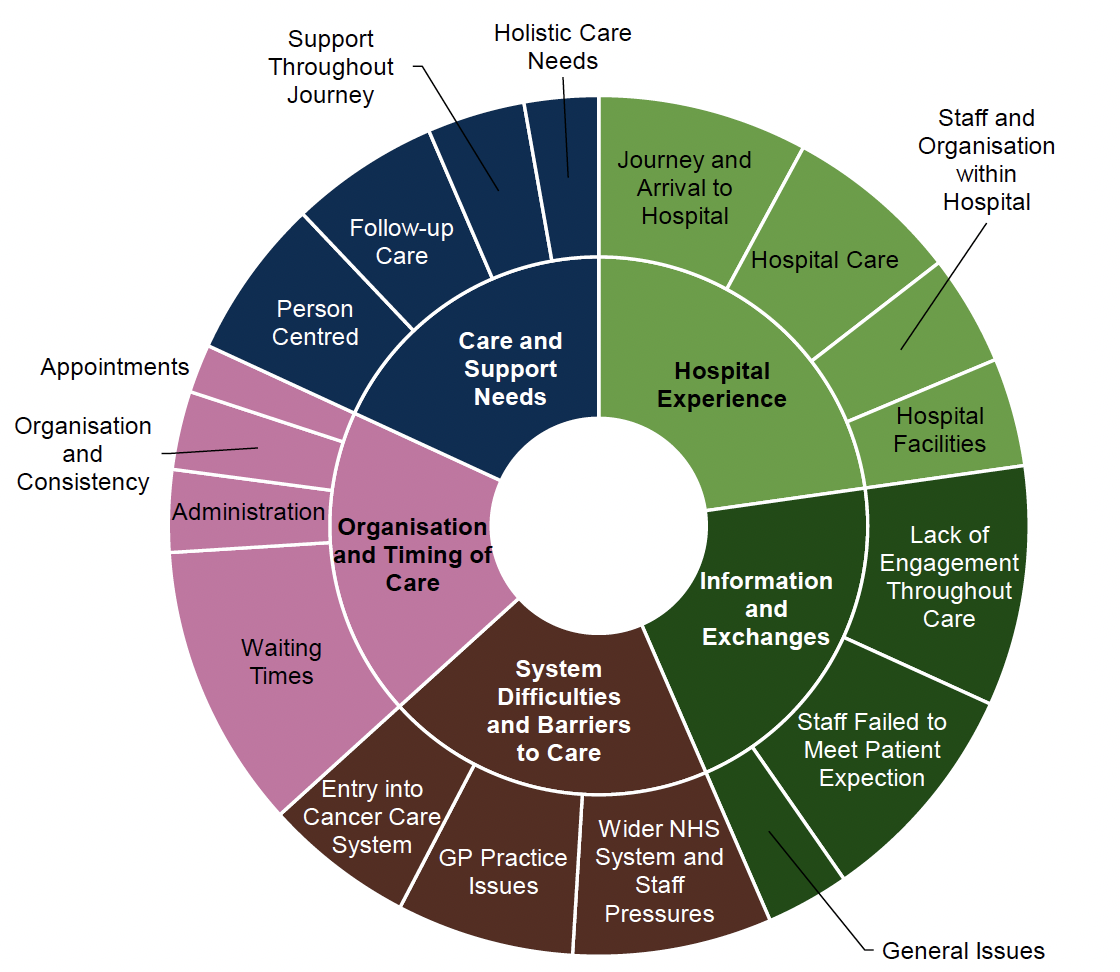
The themes and their subthemes will be discussed in turn, beginning with the largest theme from the negative responses, however, the negative themes are very closely distributed across responses and the largest and smallest themes have a difference of only 5 percentage points.
Hospital Experience
“More access to treatment locations closer to home, meaning less travelling time. During treatment the less time spent travelling to and from appointments the better.”
“Post surgery care was less than desired…I noticed some "Interesting" hygiene practices from the cleaning staff.”
“…Some of the nurses had a terrible attitude to a patient in pain, they were slow or absent from my pain control, with a lack of care and compassion…”
“…The room I had was not fit for purpose, the bed didn't rise and fall, and was too high for me, putting me at risk of falls and fractures, there was no blind on the window for privacy, the shower had a plastic visitors chair in it, which was unsafe...”
Within the theme of Hospital Experience, 4 sub-themes were identified: journey and arrival to hospital, hospital care, staff and organisation within hospital, and hospital facilities.
35% of patient comments within Hospital Experience mentioned a difficulty travelling to or arriving at the hospital.
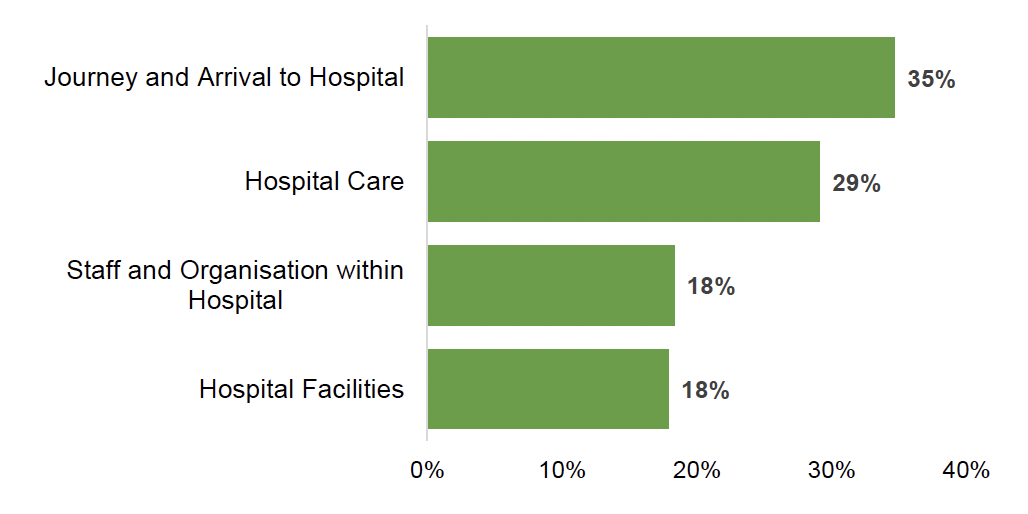
Most comments within this theme remarked on the difficulties they had travelling to the hospital and / or the challenges they experienced with car parking on arrival (35%). 29% of comments remarked that their hospital care did not meet their expectations. Some also felt that the organisation within the hospital could have been improved and the manner of staff was poor (18%). Finally, 18% of comments mentioned that the hospital facilities were lacking or were unsuitable and the food within the hospital could be improved. The percentages in Figure 15 refer to the proportion of references negatively mentioned by patients of each sub-theme category.
Information and Exchanges
“I had no idea of the full effects of the awful side effects following chemo and radiotherapy. I initially thought I wasn’t coping properly and blamed myself. It was only talking to other patients I realised the side effects were normal...”
“…I feel that there could be more communication between the GP and hospital, I seemed to have a lot of blood tests for both the GP and hospital when one may have done for both.”
“Communication - I did not receive any explanation of my initial scan result other than a letter […]. I had lots of questions but there were no contact details to ask, so had to wait two weeks for my biopsy before I could discuss this with a healthcare professional...”
Within the theme of Information and Exchanges, 3 sub-themes were identified: lack of engagement throughout care, staff failed to meet patient expectation and general issues.
44% of patient comments within Information and Exchanges felt there was a lack of engagement throughout their care.
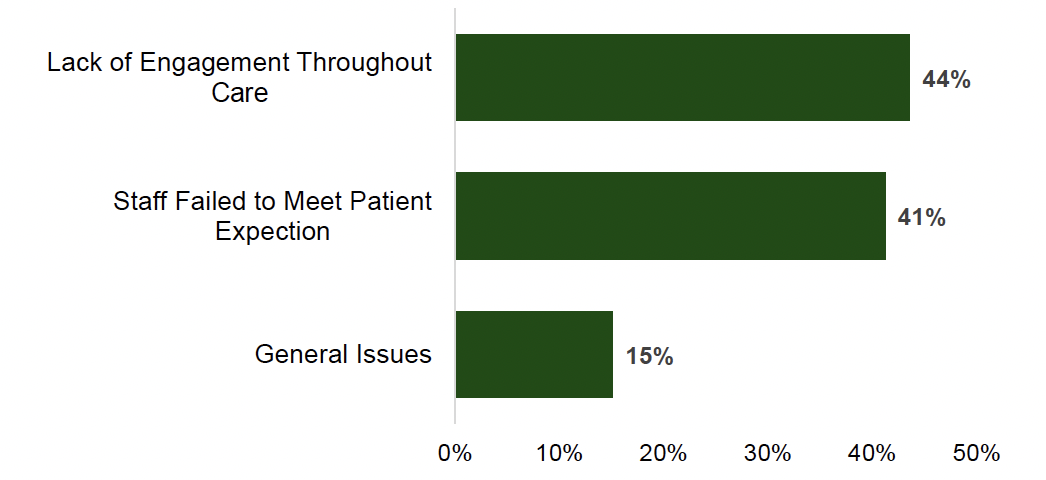
Most comments within this theme (44%), mentioned a lack of engagement within their care in different areas (i.e. discussion of results / treatment progress, information about certain topics etc.). 41% stated that staff did not meet their communication expectation through a poor method of communication or not enough communication. The general issues sub-theme represents 15% of references and included comments stating that the communication and information was poor in general. The percentages in Figure 16 refer to the proportion of references negatively mentioned by patients of each sub-theme category.
System Difficulties and Barriers to Care
“…It is obvious that the hard working dedicated medical staff are under severe time pressures which can lead to errors in care.”
“…No contact from GP since original diagnosis two years ago.”
“Myself and family are totally disappointed with how the news was delivered, [location removed]. It was devastating and no privacy or family support to be given…”
Within the theme of System Difficulties and Barriers to Care, 3 sub-themes were identified: wider NHS system and staff pressures, GP practice issues and entry into the cancer care system.
38% of comments within System Difficulties and Barriers to Care mentioned pressures they had identified throughout their care journey – either on staff, the healthcare system or both.
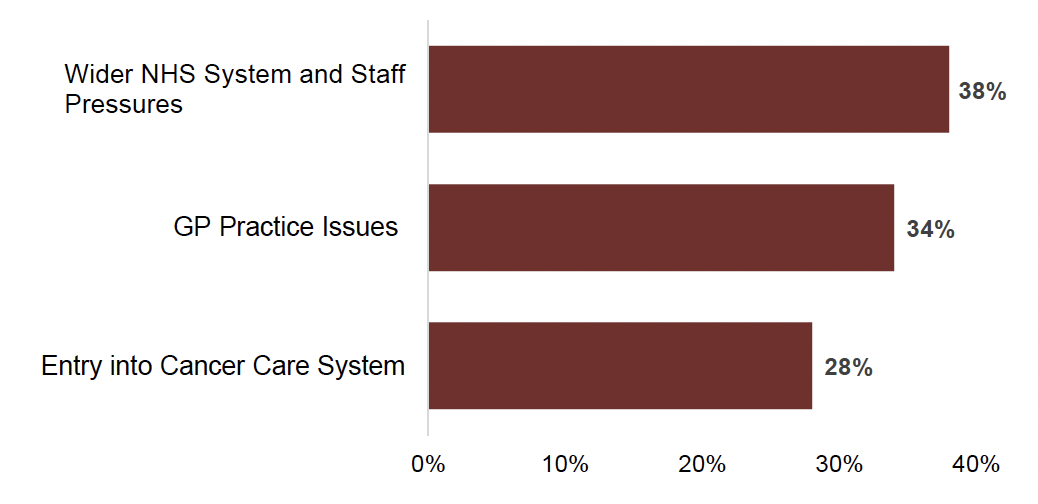
Most references within this sub-theme commented on staff and NHS service pressures (38%), including a lack of staff and the pressure the health service is under. GP practice was also noted as a topic which was problematic for patients at various stages throughout their cancer care journey either commenting about their General Practitioner, the General Practice itself or both (34%). Finally, 28% of comments within this theme referenced difficulties getting into the cancer care system. For example, slow, inefficient diagnostic processes and/or the language used to deliver a diagnosis. The percentages in Figure 17 refer to the proportion of references negatively mentioned by patients of each sub-theme category.
Organisation and Timing of Care
“The biggest problem and source of anxiety was the long waiting times both for the surgery and then the screening, biopsy and treatment for the recurrence….”
“Letters are not really of great use when sending out apps. It would be good if emails could be sent instead for certain things. I had been and gone to appointments and then the letters arrived...”
“My only criticism is the biopsy treatment timing for my first biopsy, I was booked in for [morning] but didn’t get seen till [afternoon] and I could have come for the appointment a lot later.”
“[number removed] consultants meant [number removed] stories about what would happen, what the effects of surgery would be, what the recovery would be like, what and when everything would happen; it was very frustrating trying to work out what I should listen to from whom, especially when they contradicted each other…”
Within the theme of Organisation and Timing of Care, 4 sub-themes were identified: waiting times, administration, organisation and consistency, and appointments.
58% of patient comments within Organisation and Timing of Care mentioned waiting times during their cancer care experience.
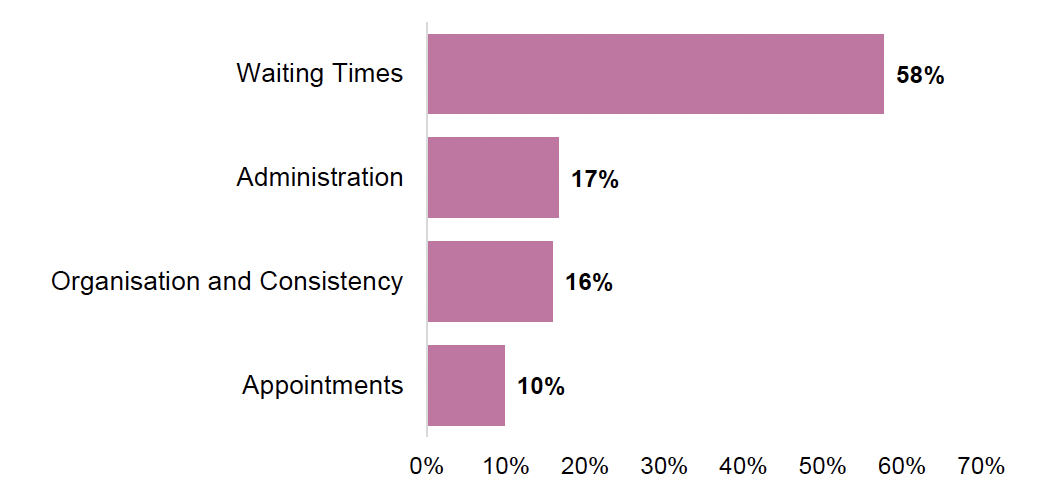
Most of the comments within in this theme referred to waiting times (58%) – this could include waiting times in general or for specific aspects of care such as results, treatment, or appointments. 17% of comments mentioned administration issues, and the availability / timing of written information. Some patients felt that the process was generally disorganised, and their care was inconsistent (16%). The remaining 10% of comments were regarding the organisation of appointments such as the appointments running late. The percentages in Figure 18 refer to the proportion of references negatively mentioned by patients of each sub-theme category.
Care and Support Needs
“Improving care involves offering personalised treatment options that match individual needs and preferences, alongside enhancing communication between healthcare providers and patients for clarity throughout the process.”
“Aftercare. I have been left with a feeling of "What now?" "Am I in remission?" "Is the cancer all gone?"…”
“…It would be good to have more structured support once the treatment is over. I am only understanding some of the information I was given now...”
“I would benefit from other services being linked in e.g. dieticians and physio to give advice on healthy eating and exercises to help stay healthy. Lots of misinformation on the internet.”
Within the theme of Care and Support Needs, 4 sub-themes were identified: person centred, follow-up care, support throughout journey and holistic care needs.
33% of comments in Care and Support Needs remarked on a care experience that was not person centred.
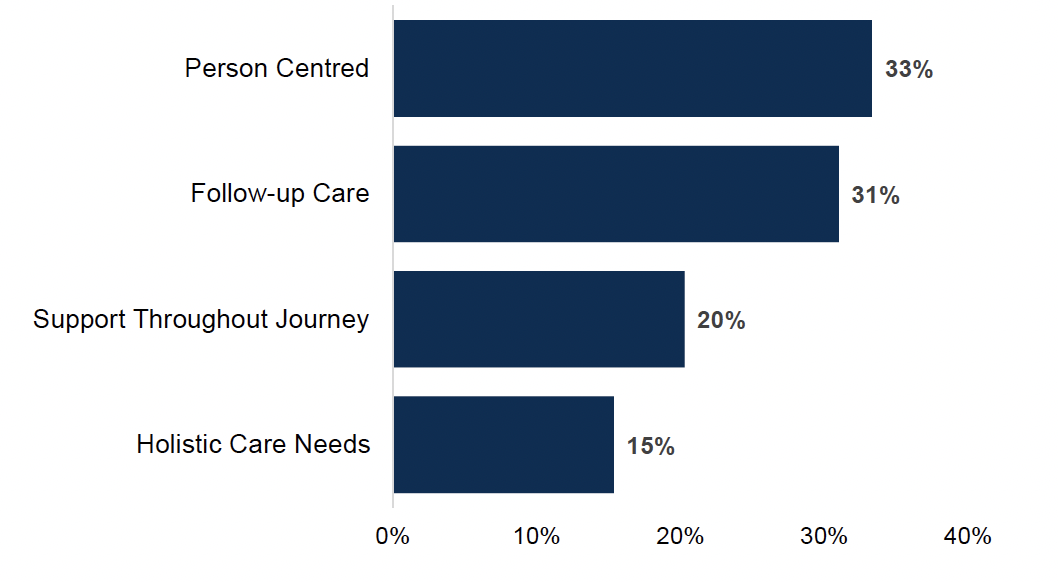
33% of patients’ comments within this theme remarked that their experience was not person centred. Follow-up care was also referenced often, with 31% commenting that their follow-up care could have been improved or that they did not receive any. Some stated that they felt as though they would have benefited from more support during their cancer journey (20%). Finally, some patients also felt as though their holistic care needs were not adequately addressed or could have been improved (15%). The percentages in Figure 19 refer to the proportion of references negatively mentioned by patients of each sub-theme category.
Other Comment Analysis
Analysis of the other comments found 4 key themes across patient responses:
- Survey Feedback (37%, 92 codes).
- Factual Statement (36%, 90 codes).
- Other (25%, 64 codes).
- Indifferent / Mixed Emotions (2%, 6 codes).
37% of comments assigned to the other category were patient comments about survey feedback and not related to their care experience. Some patients left comments which were solely factual (36%). 25% of comments in this category did not relate to the cancer experience were marked as other. Only 2% of comments referenced a mixed emotion or an indifferent experience.
Contact
Email: patientexperience@gov.scot
There is a problem
Thanks for your feedback